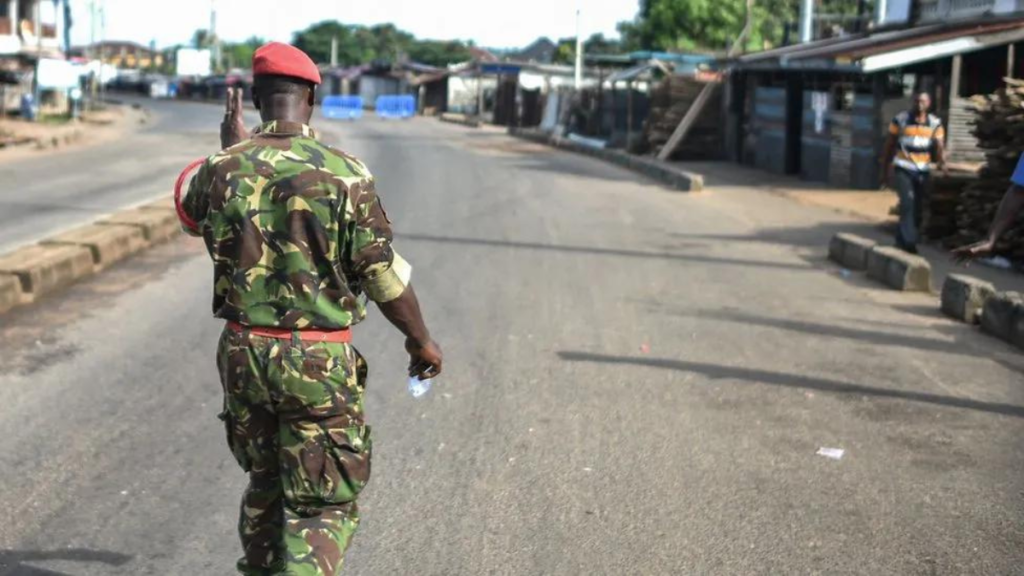Sierra Leone is facing a security crisis following a prison break, releasing detainees from several facilities. The government has imposed a nationwide curfew and canceled flights to and from the country’s only international airport. President Julius Maada Bio has not labeled the incident an attempted coup, instead focusing on the restoration of calm. The crisis is exacerbated by political tensions since the June elections, with concerns about inconsistencies, lack of transparency, and violence. The international community has condemned the violence in Sierra Leone, with the United States, European Union, United Kingdom, and Ecowas expressing strong condemnation. The situation is exacerbated by the broader regional context, with neighboring Guinea also undergoing a coup, leading to military rule in eight West and Central African countries. The international community’s condemnation underscores the gravity of the situation and the need for a swift resolution to prevent further escalation. The coming days will be crucial in determining Sierra Leone’s path forward and whether it can emerge from this tumultuous period with its democratic institutions intact.
The Prison Break and Immediate Fallout
Early on Sunday morning, armed assailants infiltrated prisons, freeing inmates and prompting a swift response from the government. The Minister of Information announced an immediate nationwide curfew, urging residents to stay indoors. Flights to and from the country’s only international airport were canceled, reflecting the severity of the situation.
President Bio later revealed that the leaders behind the attack had been apprehended, framing the incident as a threat to democracy rather than an attempted coup. The lack of specific details about the perpetrators and their motives has fueled uncertainty, contributing to the tense atmosphere.
Political Tensions Since June Elections
The backdrop of the current crisis is the political tension that has persisted since June when President Bio was re-elected, narrowly avoiding a runoff. International observers raised concerns about inconsistencies and a lack of transparency in the electoral process, coupled with instances of violence and intimidation. These issues have created a volatile political environment, setting the stage for the recent events.
Security Forces’ Response and Civilian Impact
Reports from Freetown paint a picture of heightened security measures, with soldiers patrolling deserted streets carrying heavy weaponry. The atmosphere is tense, and some soldiers have been heard expressing their intention to “clean Sierra Leone.” The extent of the prison break remains unclear, but social media videos depict individuals, possibly including rapper Boss LAJ, fleeing the Central Pademba Road prison. Authentication of these videos is pending.
The immediate impact on civilians is evident in the imposition of the nationwide curfew and the cancellation of flights, restricting movement and causing disruptions. The fear of further violence lingers, highlighting the fragility of the security situation.
Historical Context: August Coup Plot and Regional Concerns
This recent incident follows an attempted coup in August, where several soldiers were arrested for plotting against President Bio. The recurrence of such events underscores the challenges facing Sierra Leone’s stability. The situation is exacerbated by the broader regional context, with neighboring Guinea also undergoing a coup, leading to military rule in eight West and Central African countries.
International Response and Condemnations
The international community has swiftly condemned the violence in Sierra Leone. The United States, European Union, United Kingdom, and the regional bloc Ecowas have released statements expressing strong condemnation. The events in Sierra Leone add to the growing list of political upheavals in the region, raising concerns about the stability of West and Central Africa.
Conclusion: Uncertainty and the Road Ahead
Sierra Leone finds itself at a crossroads, grappling with the aftermath of a prison break that has plunged the nation into a state of emergency. The political tensions that have simmered since the elections in June have erupted into a full-blown crisis, prompting a nationwide curfew. As the government works to restore order, questions linger about the motives behind the attack and the potential for further unrest. The international community’s condemnation underscores the gravity of the situation, emphasizing the need for a swift resolution to prevent further escalation. The coming days will be crucial in determining Sierra Leone’s path forward and whether it can emerge from this tumultuous period with its democratic institutions intact.







